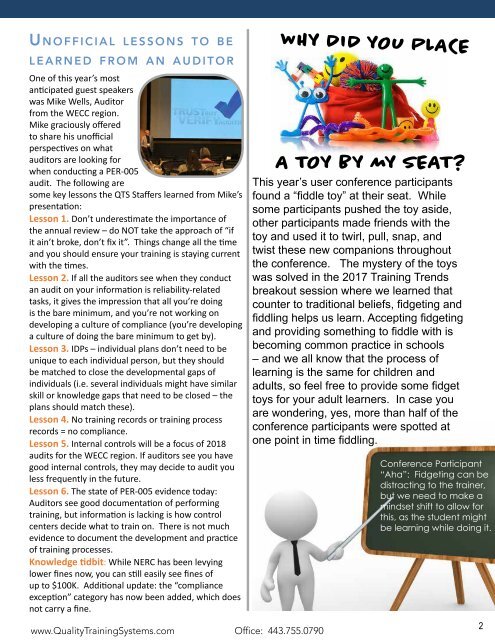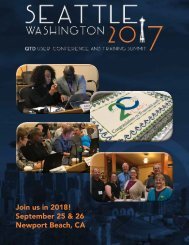You also want an ePaper? Increase the reach of your titles
YUMPU automatically turns print PDFs into web optimized ePapers that Google loves.
U n o f f i c i a l lessons to be<br />
l e a r n e d from an auditor<br />
One of this year’s most<br />
anticipated guest speakers<br />
was Mike Wells, Auditor<br />
from the WECC region.<br />
Mike graciously offered<br />
to share his unofficial<br />
perspectives on what<br />
auditors are looking for<br />
when conducting a PER-005<br />
audit. The following are<br />
some key lessons the QTS Staffers learned from Mike’s<br />
presentation:<br />
Lesson 1. Don’t underestimate the importance of<br />
the annual review – do NOT take the approach of “if<br />
it ain’t broke, don’t fix it”. Things change all the time<br />
and you should ensure your training is staying current<br />
with the times.<br />
Lesson 2. If all the auditors see when they conduct<br />
an audit on your information is reliability-related<br />
tasks, it gives the impression that all you’re doing<br />
is the bare minimum, and you’re not working on<br />
developing a culture of compliance (you’re developing<br />
a culture of doing the bare minimum to get by).<br />
Lesson 3. IDPs – individual plans don’t need to be<br />
unique to each individual person, but they should<br />
be matched to close the developmental gaps of<br />
individuals (i.e. several individuals might have similar<br />
skill or knowledge gaps that need to be closed – the<br />
plans should match these).<br />
Lesson 4. No training records or training process<br />
records = no compliance.<br />
Lesson 5. Internal controls will be a focus of 2018<br />
audits for the WECC region. If auditors see you have<br />
good internal controls, they may decide to audit you<br />
less frequently in the future.<br />
Lesson 6. The state of PER-005 evidence today:<br />
Auditors see good documentation of performing<br />
training, but information is lacking is how control<br />
centers decide what to train on. There is not much<br />
evidence to document the development and practice<br />
of training processes.<br />
Knowledge tidbit: While NERC has been levying<br />
lower fines now, you can still easily see fines of<br />
up to $100K. Additional update: the “compliance<br />
exception” category has now been added, which does<br />
not carry a fine.<br />
www.QualityTrainingSystems.com Office: 443.755.0790<br />
WHY DID YOU PLACE<br />
A TOY BY MY SEAT?<br />
This year’s user conference participants<br />
found a “fiddle toy” at their seat. While<br />
some participants pushed the toy aside,<br />
other participants made friends with the<br />
toy and used it to twirl, pull, snap, and<br />
twist these new companions throughout<br />
the conference. The mystery of the toys<br />
was solved in the 2017 Training Trends<br />
breakout session where we learned that<br />
counter to traditional beliefs, fidgeting and<br />
fiddling helps us learn. Accepting fidgeting<br />
and providing something to fiddle with is<br />
becoming common practice in schools<br />
– and we all know that the process of<br />
learning is the same for children and<br />
adults, so feel free to provide some fidget<br />
toys for your adult learners. In case you<br />
are wondering, yes, more than half of the<br />
conference participants were spotted at<br />
one point in time fiddling.<br />
<strong>Conference</strong> Participant<br />
“Aha”: Fidgeting can be<br />
distracting to the trainer,<br />
but we need to make a<br />
mindset shift to allow for<br />
this, as the student might<br />
be learning while doing it.<br />
2



